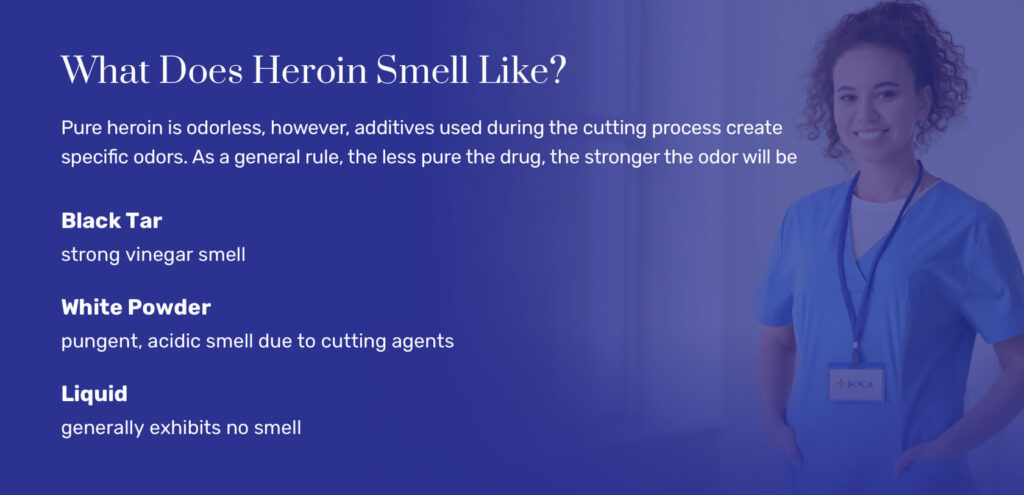
Heroin (also known as diacetylmorphine) has its own particular smell that is perhaps not as recognizable to common folks as, say, the smell of cannabis flower or smoke. Pure heroin is odorless, however, additives used during the cutting process create specific odors.
In the following paragraphs, we will try to help you to identify or at least have an idea of what it is you are smelling when you come into contact with heroin. Knowing when you are around this substance can help you reduce your chances of being exposed to it or ultimately using heroin. If you’re concerned that someone may already be using heroin, our Indiana drug and alcohol rehab provides medical guidance and support for those at risk.
Heroin’s Smell
Pure heroin has no smell, but the types of heroin bought on the street differ due to additives and chemicals used in its processing. Heroin also may smell differently due to the type of heroin it is as well as the form it is in. The most commonly associated smell is that of acidic vinegar.
As pure heroin has no smell, it is easy to deduce that the smell derives from the additives and chemicals added. These additives affect the processing involved and can change the smell when smoked or ingested. These additives can also generate a smell when the drug is being cooked and turned into an injectable form.
The Smell of Heroin by Type
There are three main forms of heroin procured and used by most heroin users.
Black Tar
Black tar is the least refined and least pure of the three types of heroin. Therefore, black tar is the cheapest for the end user to purchase. This form is prone to having an especially strong vinegar smell.
Black tar heroin can look like a hard rock, or as its name implies, it can look like a gummy blob or smear. It is often cut with additives, such as rat poison, soil, and coffee grounds. This form is typically “cooked” (processed), and this is most often where the smell comes in.
White Powder
White powdered heroin, also known as China white, is generally the purest form of heroin.
Again, in its purest form, heroin does not exhibit a smell. However, being cut with another substance will often give heroin a specific odor, often producing a pungent, acidic smell.
Liquid
Liquid heroin is often ingested as a beverage, but it is often stored in eye dropper containers. Liquid heroin generally exhibits no smell.
Cutting Agents That Impact Smell
Cutting agents are typically used to increase the product bulk, thereby increasing the profit for dealers. Less actual heroin is used, and the product is bulked up with fillers that are inexpensive.
The cutting agents are normally one of three types: non-toxic, toxic, and pharmaceutical.
Non-Toxic Agents
Non-toxic cutting agents that affect smell include sugar or sucralose, cornstarch, flour, and powdered milk. Each substance carries a distinct smell, and its presence will influence the smell of the specific heroin batch.
Toxic Agents
Toxic cutting agents that can affect the smell of heroin include laundry detergent and rat poison, which are two toxic agents often used to cut heroin. Even though small amounts are used to cut heroin, they are significant enough to affect the smell of the batch.
Pharmaceutical Agents
Pharmaceutical cutting agents include two types: stimulants and depressants. Stimulants will include things such as methamphetamines, caffeine, and cocaine. Depressants generally include opioid painkillers, fentanyl, and lidocaine among others.
Given all the cutting agents used in the manufacturing of heroin, it is easy to see why there will be a recognizable odor. As a general rule, the less pure the drug, the stronger the odor will be.
For help navigating recovery, call us or visit our Massachusetts alcohol & drug rehab for personalized guidance.
- Heroin Toxicity. (May 2022). StatPearls.
- Experiences With Take-Home Dosing in Heroin-Assisted Treatment in Switzerland During the COVID-19 Pandemic–Is an Update of Legal Restrictions Warranted? (March 2022). International Journal of Drug Policy.
- Sold as Heroin: Perceptions and Use of an Evolving Drug in Baltimore, MD. (December 2017). Journal of Psychoactive Drugs.
- Why Would Anyone Cut Heroin With Fentanyl? It's Cheap, These Researchers Say. (December 2018). NBC News.
















